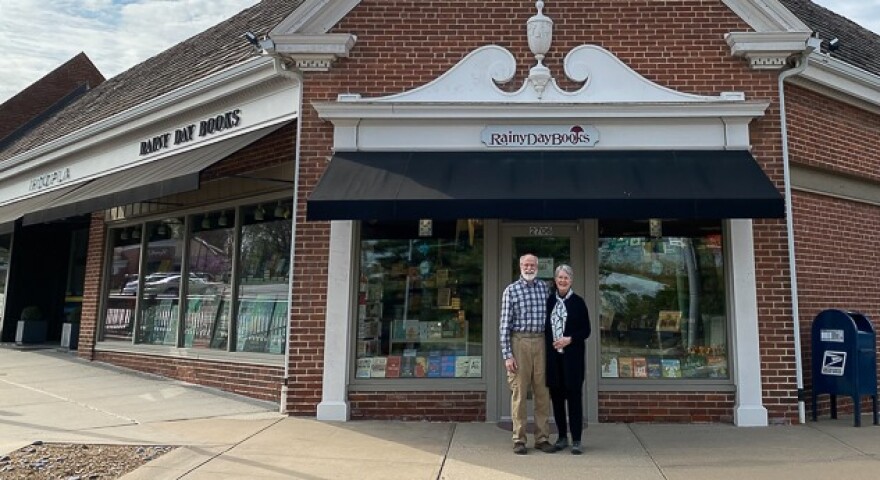Before the coronavirus pandemic, there was a sense of optimism among independent bookstores in the Kansas City region.
New stores were opening and established favorites were finding new ways to thrive in the age of Amazon. But now, COVID-19 and the widespread shutdowns it has prompted, threaten to derail that momentum.
Both upstarts and established local brands are in an increasingly frenetic search to find ways to stay afloat and are asking customers for their support, pleading with them to shop online and, in come cases, going so far as to ask directly for donations.
“These are some of the great bastions of reading and literature and bring a great sense of community," said Fred Logan, who recently donated to an online fundraiser for Rainy Day Books in Fairway, Kansas.
"Without them we lose a great deal."
Still working hard but with limited payoff
When metro-wide stay-at-home orders went into effect last month, Rainy Day Books found itself in uncharted territory as they closed their doors for the first time in its 45-year history.
On a recent weekday, owner Vivien Jennings could be seen — as she has been many days during the shutdown — sitting at a makeshift desk next to the front door. Her partner Roger Doeren was packaging books for delivery in the basement, while two employees helped Jennings prepare curbside pickup orders.
That’s the extent of the staffing, for now, Jennings said.
“We’ve got the skeleton crew who can work inside,” Jennings said. “Roger, my partner, and me, we’ve been working nonstop and then we have a team of three people, we just added a fourth one who can help us with everything else.”

The store has moved completely to phone and online orders, offering curbside and mail delivery. Jennings said those orders are still flying in, sometimes faster than they can handle.
“We’re working really hard and we really like doing it but it’s a lot faster-paced than we would normally be doing during the day,” she said.
The bookstore has had to cancel or postpone its signature author appearances, as well as education and corporate book orders. All combined, that makes up 50% of Rainy Day's annual revenue.
Even with the marked increase in online orders during the pandemic, Jennings said her store is facing a potential six-month revenue shortfall.
Carrie Obry, Executive Director of the Midwest Independent Booksellers Association, said many indie bookstores find themselves in Rainy Day's position.
“Booksellers are rushing throughout the day to fill all these orders for less money often, so they’re really overworked while their financial situation is not so great," Obry said.
Without the revenue from in-store events, author signings and large corporate orders, many bookstores are considering closing for good.
“When they would have had an author event in their store, they would have captured hundreds of sales from that event. Whereas now, they’re reliant on trusting and hoping that the consumer will go to their website and buy the books,” Obry said.
Trying to keep community
Wise Blood Booksellers is another Kansas City bookstore working through uncertain times. They had been open for about 4 months when stay-at-home orders went into effect in March.
“We were still just kind of figuring things out and getting the hang of things when this came upon us,” said manager Dylan Pyles.
An offshoot of Mills Record Company on Broadway nearby, Pyles said Wise Blood has been quick to pivot, trying to find new ways to engage with customers.
“We’ve kinda just been leaning into those things that we’ve been doing like social media presence and reputation,” Pyles said. “We were able to harness that to build a community atmosphere even though we can't have people physically come in.”

Community is key for much of the recent success independent bookstores were seeing across the country before the pandemic. A recent Harvard study said what makes indie bookstores successful in a market increasingly dominated by Amazon is their emphasis on community, The study also concluded that local bookstores are valued for curating individual customers' experiences and convening events for people to come together.
While it may seem that without these perks many customers will turn to Amazon during the pandemic, but Jennings believes these factors will instead help sustain bookstores like hers in tough times.
“The Kansas City community made good memories with us and supported us in person,” Jennings said. “I’m confident they will [support us] online, too.”
Customers help out
Pyles said Wise Blood’s social media orders and engagement have seen an uptick since the pandemic started. At Rainy Day, Jennings started an fundraiser campaign at GoFundMe.com earlier in April that has so far raised just over $70,000.
Fred Logan, a long-time Rainy Day customer, donated immediately when he saw it.
“What makes [Rainy Day Books] special is how every experience was unique,” Logan said. “You always left with a good recommendation.”
Carrie Obry says it's unclear how things will look for independent bookstores when the dust settles from the pandemic. While there was a lot of momentum in the Midwest for indie bookstores before the crisis, how the coronavirus will change these stores' identities as community gathering places remains to be seen.
Dylan Pyles of Wise Blood described his outlook as "sober hopefulness."
“We are just going to continue to work as hard as possible on the things we can control,” he said.
Jennings, who has survived economic recessions and the rise of online retail better than many of her colleagues, is even more confident.
“I really do think that people understand the role that we have in the community,” she said. “Not only what we’ve done previously and contribute but also what we are capable of contributing going forward.”
As if to underscore that point, in a message on the store's GoFundMe page, Rainy Day assured its customers they would be back open by November, in time to celebrate the store's 45th anniversary.



